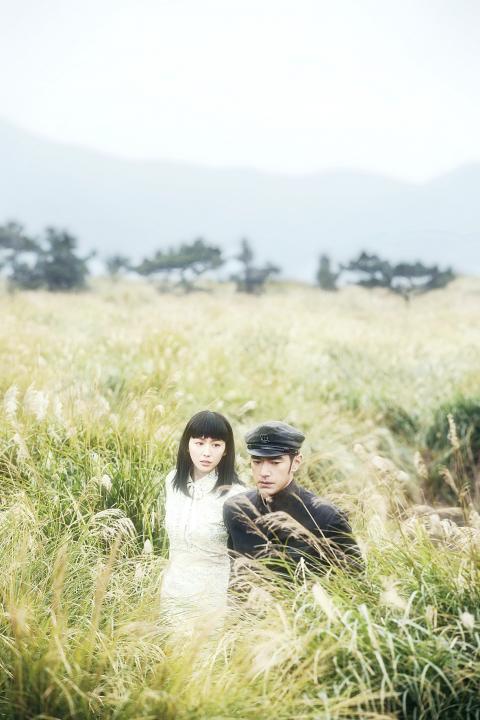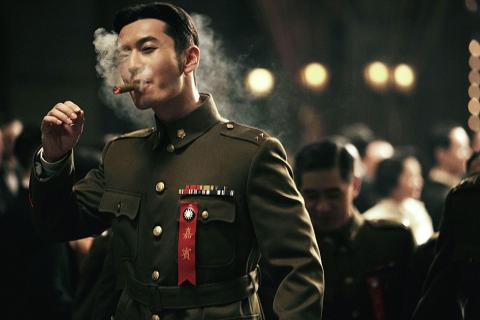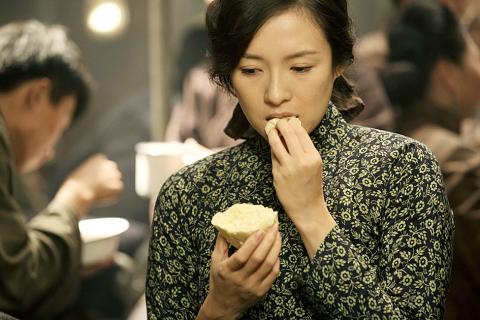Internationally renowned for his action film series A Better Tomorrow (英雄本色) and Hollywood action flicks Face/Off and Mission: Impossible 2, Hong Kong director John Woo (吳宇森) has, as of late, developed an interest in historical epics. Five years after his diptych Red Cliff (赤壁), which centers on the legendary Battle of Red Cliffs (赤壁之戰) during China’s Three Kingdoms period, Woo returns to the big screen with The Crossing I (太平輪:亂世浮生), a highly anticipated story about the modern history of Taiwan and China.
Set during the turbulent war years of the 1940s, when Chiang Kai-shek (蔣介石) and his nationalist army fled to Taiwan after losing the civil war to the communists, the NT$2 billion (US$64 million) film is sumptuously outfitted with a pan-Asian, all-star cast headed by China’s Zhang Ziyi (章子怡), Huang Xiaoming (黃曉明) and Tong Dawei (佟大為), Taiwanese-Japanese actor Takeshi Kaneshiro (金城武), Japanese actress Masami Nagasawa and Song Hye-kyo from South Korea.
Dubbed the Chinese version of Titanic, The Crossing I is an epic love story — or three, to be exact, as the film zooms in on three couples who escape China on an ill-fated ship bound for Taiwan in 1949 during the retreat of the Chinese Nationalist Party (KMT).

Photo Courtesy of Vievision Pictures
The story is based on the true story of the sinking of the Taiping, a luxury steamer that capsized after it collided with a cargo ship from Taiwan the day before Chinese New Year’s Eve. Some 1,000 crew and passengers, many of whom were KMT officials, socialites and the well-heeled lost their lives.
For this first segment, Woo takes his time to define his characters through anecdotes, and builds up the narrative tension with high drama and massive battle sequences. It opens with KMT general Lei Yifang (Huang) defeating the Japanese troops in 1945. On the battlefield, signaler Tong Daqing (Tong) captures Yan Ze-kun (Kaneshiro), a Taiwanese doctor working for the Japanese army. Returning to Shanghai after the Japanese surrender, Lei encounters Zhou Yunfen (Song), the daughter of an influential Chinese banker, during a function. It’s love at first sight. A sumptuous fairy tale wedding is subsequently held.
Meanwhile, Tong meets the poverty-stricken Yu Zhen (Zhang) on the streets of Shanghai. Yu is searching for her lover, who had been recruited by the KMT army. Their paths cross and quickly separate again, leaving Tong longing for a second encounter. But Yu is determined to find her lover but ends up working as a prostitute.

Photo Courtesy of Vievision Pictures
Released from the prisoner-of-war camp when the war ends, Yan returns to Taiwan, only to find that his Japanese girlfriend, Noriko (Nagasawa), has been repatriated to Japan. Peace doesn’t last, however, as the looming civil war soon becomes a reality. Lei sends his wife to Taiwan before departing for the frontline. Across the Taiwan Strait, Zhou has a premonition that she might never see her husband again, who is fighting the doomed battle against the Communist Chinese army.
The Crossing I is an ambitious project that weaves together three parallel and at times intersecting storylines to tell an epic tale of love and hope in a turbulent age. Supported by a top-notch technical crew, the film’s graphic battle sequences eloquently depicts the cruelty of war and serve as a counterpoint to the characters’ longing for peace. Warm and light-hearted humor balances the action and heavy drama. One fine example involves Tong’s characters and a solider from the enemy putting their guns down to share a meal.
As Woo’s oeuvre has shown, the director is adept at telling stories about brotherhood. But when it comes to romance, he’s a little out of his comfort zone. Co-written by Wang Hui-ling (王蕙玲) — Crouching Tiger, Hidden Dragon (臥虎藏龍) and Lust, Caution (色戒) — the story is noticeably uneven in its depiction of the three couples. The cliche-filled dialogue between the general and the beautiful socialite does little justice to its powerful theme; it is equally embarrassing to see the 41-year-old Kaneshiro playing a teenager bantering with his first love in the film’s flashbacks.

Photo Courtesy of Vievision Pictures
It will be interesting to see if director Woo has something more substantial to say about love and the political consequences of the historical events in the diptych’s second part, scheduled for release in Asia in May of next year.

In the March 9 edition of the Taipei Times a piece by Ninon Godefroy ran with the headine “The quiet, gentle rhythm of Taiwan.” It started with the line “Taiwan is a small, humble place. There is no Eiffel Tower, no pyramids — no singular attraction that draws the world’s attention.” I laughed out loud at that. This was out of no disrespect for the author or the piece, which made some interesting analogies and good points about how both Din Tai Fung’s and Taiwan Semiconductor Manufacturing Co’s (TSMC, 台積電) meticulous attention to detail and quality are not quite up to

April 21 to April 27 Hsieh Er’s (謝娥) political fortunes were rising fast after she got out of jail and joined the Chinese Nationalist Party (KMT) in December 1945. Not only did she hold key positions in various committees, she was elected the only woman on the Taipei City Council and headed to Nanjing in 1946 as the sole Taiwanese female representative to the National Constituent Assembly. With the support of first lady Soong May-ling (宋美齡), she started the Taipei Women’s Association and Taiwan Provincial Women’s Association, where she

Chinese Nationalist Party (KMT) Chairman Eric Chu (朱立倫) hatched a bold plan to charge forward and seize the initiative when he held a protest in front of the Taipei City Prosecutors’ Office. Though risky, because illegal, its success would help tackle at least six problems facing both himself and the KMT. What he did not see coming was Taipei Mayor Chiang Wan-an (將萬安) tripping him up out of the gate. In spite of Chu being the most consequential and successful KMT chairman since the early 2010s — arguably saving the party from financial ruin and restoring its electoral viability —

It is one of the more remarkable facts of Taiwan history that it was never occupied or claimed by any of the numerous kingdoms of southern China — Han or otherwise — that lay just across the water from it. None of their brilliant ministers ever discovered that Taiwan was a “core interest” of the state whose annexation was “inevitable.” As Paul Kua notes in an excellent monograph laying out how the Portuguese gave Taiwan the name “Formosa,” the first Europeans to express an interest in occupying Taiwan were the Spanish. Tonio Andrade in his seminal work, How Taiwan Became Chinese,